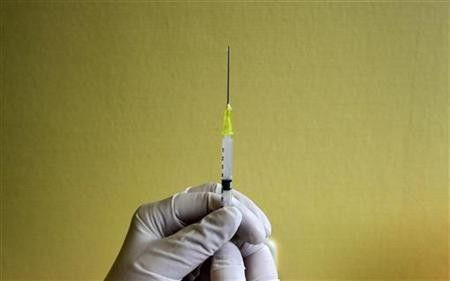Needle-Free Ebola Vaccine On The Horizon

Injections, aside from oral medication, are one of the ways to treat a patient. However, the use of needles – whether through syringes or intravenous feeds – could go wrong under the hands of a new medical worker and scar forever the sick person physically and mentally.
That is why researchers are coming up with needle-less solutions, whether it is used to deliver insulin, or provide immunity to newborns. In line with the growing interest in needle-free methods, the University of Texas Medical Branch, or UTMB, at Galveston and National Institutes of Health have developed a vaccine against Ebola for primates that is inhalable, reports Eurekaalert.
The discovery in previous studies that the airway linings are vital entry points for the Ebola virus, based on infections among primates of the Ebola virus through its mucus membranes lining the animal’s respiratory track led to testing of aerosolised delivery of an Ebola vaccine. The method will provide immunity to monkeys without needing to deploy trained medical personnel who are knowledgeable and experienced with immunisation, said Michelle Meyer, lead author of the study and UTMB postdoctoral fellow in the university’s department of pathology.
Virologist Alex Bukreyev, senior author of the study and UTMB professor, explains, “A single-dose aerosol vaccine would enable both prevention and containment of Ebola infections, in a natural outbreak setting where healthcare infrastructure is lacking or during bioterrorism and biological warfare scenarios.” He said it is the first time that successful aerosol vaccination against a viral hemorrhagic fever was demonstrated by the study, published in the Journal of Clinical Investigation.
The vaccine was tried n rhesus macaques, a monkey species that Ebola research use. However, there are no vaccines yet against Ebola for humans. But there are two clinical trials ongoing which the World Health Organisation, or WHO, hopes to have a safe and effective vaccine for humans by the end of 2015.
One vaccine, ChAd3-ZEBOV, is being developed by pharma giant GlaxoSmithKline in collaboration with the US National Institute of Allergy and Infectious Diseases. The other one, VSV-EBOV, is being developed by NewLink Genetics and Merck Vaccines USA in collaboration with the Public Health Agency of Canada.
Results of the clinical trials’ first phase, published in the New England Journal of Medicine, showed that both vaccine candidates are safe and well-tolerated in humans. Phases II and III of the VSV-EBOV is ongoing in Guinea and Sierra Leone.
To contact the writer, email: vittoriohernandez@yahoo.com





















